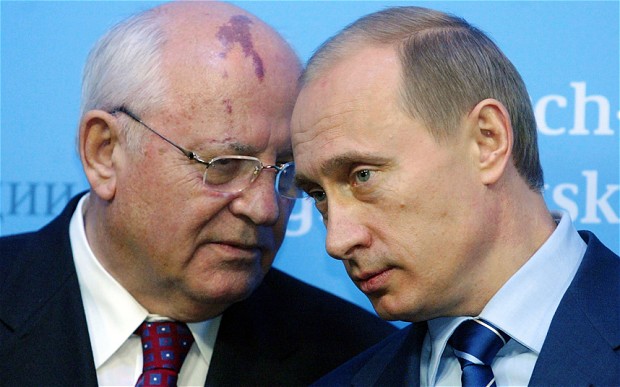Slavoj Zizek, the Slovenian thinker, was asked about the possibility of a new Cold War after his recent lecture at the London School of Economics. He responded that it looks plausible given the current world order of competition between the US, Russia and China.
Recent statements by the last Soviet leader, Mikhail Gorbachev, had indeed ‘animated’ this subject. Gorbachev was, however, talking about US – Russia relations: “The world is on the brink of a new Cold War. Some are even saying that it has already begun,” said Gorbachev, now 83, at an event to celebrate the 25th anniversary of the fall of the Berlin Wall.
Mr Gorbachev accused the West and the US of “triumphalism” after the fall of Soviet dominance in Eastern Europe, and stated that trust between Russia and the West had collapsed during the events in Ukraine. Before arriving in Berlin he had said that the Ukraine crisis offered an excuse for the US to victimise Russia. He then offered his explicit support for Vladimir Putin: “I am absolutely convinced that Putin protects Russia’s interests better than anyone else”.
Surprisingly, his opinions were echoed in the words of a former central figure in the Cold War era. Former US Secretary of State, Henry Kissinger, also warned of a possible new Cold War, and regarded the West’s approach to the Ukraine crisis a “fatal mistake”.
“This danger does exist and we can’t ignore it,” Kissinger said. If the West wants to be “honest” it should recognise that it made a “mistake”, he said of the measures the US and the EU took following the Ukrainian conflict. Europe and the US did not understand the “significance of events” that started with the Ukraine-EU economic negotiations. He believes that Russia should have been included in the discussion. Regarding Germany’s stance Kissinger also said he would expect more action from Berlin. As the most “important” country in Europe it should be more “proactive” rather than reactive, he said.
Prominent scholar, Noam Chomsky, is also of the opinion that Russia and the West have slipped back into a situation that resembles the Cold War. Once NATO has expanded its borders all the way to reach Russia, its mission has very much changed since it was initially established, Chomsky said. Now, NATO’s aim is to take control of global energy systems rather than maintaining an intergovernmental military balance.
The Finnish president, Sauli Niinistö, is also worried about the latest tensions in Eastern Europe. “Western countries are at the gates of a new Cold War with Russia, sparked by the Ukraine crisis and a continuing failure to grasp the depth and seriousness of Vladimir Putin’s grievances with the US and EU,” he said.
The only other EU head of state to comment on the subject seemed to verify rather than dispel the Cold War anxiety. “Russia could plunge the World into a new Cold War and poses a ‘grave danger’ to Europe because of its actions in Ukraine,” said David Cameron. Mr Cameron added that the world should not forget the “consequences of turning a blind eye when big countries in Europe bully smaller countries”. Promising to confront Putin at the G20 Summit in Brisbane he justified the economic sanctions on Russia as “not just morally right” but also in Britain’s “national and economic interests” because Russia has “ripped up the rule book”.


